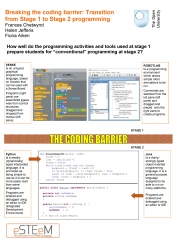eSTEeM
Centre for Scholarship and Innovation
Reflections from the CEP Conference
9th February 2017
eSTEeM project leaders Frances Chetwynd, Fiona Aiken and Helen Jefferis reflect on the recent Computing Education Practice (CEP) Conference which took place in Durham on the 11th January 2017.
This one day conference was held at Durham University and was attended by around 70 UK delegates, including several members of staff from the Open University.
The conference opened with a welcome and introduction to the conference from Sarah Drummond and Steven Bradley they were then followed by a keynote ‘How can we talk about practice?’ from Prof. Sally Fincher from the University of Kent. She started by pointing out that practice is intimately related to context – teaching is different in different universities; teaching is not like conducting a repeatable experiment and even if an individual teaches the same material to a different group of students then the outcomes will be different. This means it is very hard to document and share work, so in her talk she looked at several methods of trying to capture practice and suggested some ideas in order to form a common vocabulary in order to facilitate more effective collaboration.
 The rest of the conference consisted of 3 parallel streams and include the following highlights:
The rest of the conference consisted of 3 parallel streams and include the following highlights:
An analysis of introductory University programming courses looked at 70 institutions and over 13,000 students – 106 languages were in use across the institutions, but Java is the most used, followed by C-family languages and third Python. Changing languages can be confusing for students, but does underline the idea that concepts are transferrable. The top reasons for choice of language were:
- Java – industry relevance; using an OO language; availability/cost
- Python – Pedagogical benefits; availability/cost; platform independence
Other topics covered were the use of Lego Serious Play to stimulate reflective practice; an innovative approach to teaching CS with a first year based entirely around workshops and no imposed teaching order; and a university who are offering non-STEM students a ‘year in computing’. Not all the ideas are immediately transferable to the OU setting but gave us plenty to think about.
Finally employability was a hot topic as expected. The field of cybersecurity was raised as an economic and societal priority. It was reported that 350 000 openings in this field exist worldwide today and by 2020 there will be 2 million cybersecurity posts to be filled. In another talk we were told that professional ethics is an area of the CS curriculum which students are reluctant to engage with as the technical side of computing is their main interest.
We presented a session ‘How high is the coding barrier? A quantitative analysis of student transitions from stage 1 to stage 2 programming.’ This was the first time we had shared our results and doing so with a mostly non-OU audience meant we had to think harder about how to explain out particular model. However it was generally received well and gave us some ideas and thoughts for further research. Details of our eSTEeM project can be found under 'Projects'.
News
- The Benefits of Developing a Community of Practice for OU Associate Lecturers 11th March 2024
- Registration now open for the 13th eSTEeM Annual Conference 27th February 2024
- eSTEeM Call for Scholarship Proposals January 2024 22nd January 2024
- The 13th eSTEeM Annual Conference 2024: Call for abstracts now open 5th December 2023
- New eSTEeM projects now up and running 30th November 2023